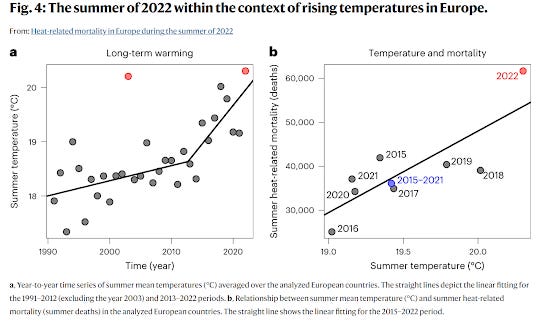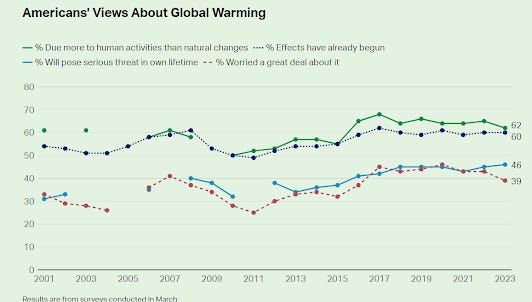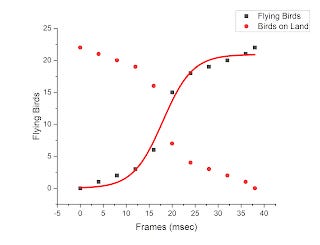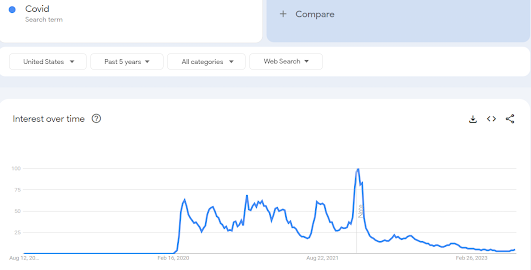Losing the Planet: Switching from complacency to panic?
2022 was the year that saw confirmation that global warming not only exists but is moving onward at an accelerating rate. Facing data such as the above, the logical reaction should have been a push to do something to avoid the worse. Yet, the result has been the opposite: people have ignored these data or dismissed them as a scam. It is a memetic problem. Figure from Ballester et Al. 2023.
The conventional wisdom on climate used to be that people would gradually realize the gravity of the climate threat due to its increasingly evident effects: higher temperatures, ice melting, catastrophic events, and the like. Then, they would clamor for something to be done about it.
It not happening. Here are some recent data from Gallup for the United States. The situation is not very different in other countries.
At present, we are at about the same level of concern as 20 years ago, and the temperature records of 2022 and 2023 had no impact on public perception. On the contrary, from what you can read on social media, they generated a strong counter-reaction among large numbers of people who claim that it is all a scam to enslave them.
So, conventional wisdom was wrong: we cannot gradually convince people that there is a problem with climate. But there may be another possibility: that of a sudden change in the public perception generated by a spectacular event.
It can happen. In 2020, in a couple of months, the public moved from a basically zero level of concern about viral infections to a nearly universal perception of an existential threat from the Covid virus. Another example is the attack on the World Trade Center in New York in September 2001 which led to a suddenly increased perception of a serious threat from terrorism. There are many others.
Independently of whether the threats were real or not, these events can be described as memetic phase transitions (the term "meme" indicates a set of ideas that moves from one person to another). That is, a rapid and complete change in the views of a large number of people.
These transitions are part of the way brains work. They have been noted first, perhaps, by James Schlesinger when he said that "people have only two modes of operation: complacency and panic." Even the brains of other species seem to work in the same way. Let me show you the Schlesinger principle at work with birds.
Some birds are foraging in a field. One bird sees something suspicious, it flies up, and, in a moment, all the birds are flying away. It is a memetic transition: nothing physical changes, just the mental state of the birds, which become dominated by the meme that says, "Hey, maybe there is a predator around!"
You can see in the figure the fitting of the number of flying birds as a function of time using a logistic function.
The Covid meme went through a similar phase transition in 2020 that lasted for about two years. Note how at the beginning it followed a curve that looks like a logistic, then it oscillated for a couple of years around a plateau.
But there is no such transition if we search Google Trends for terms related to global warming. On the contrary, we see a steady decline for the "global warming" term and a marginal increase for "climate change." (there is a spike in the data created by Google placing "climate change" in the banner of their search engine. It is a fluke, do not consider it).
It doesn't mean that a memetic transition couldn't happen for climate, but two questions are in order 1) Can it really happen? and 2) If it happens, would it be a good thing? My opinion is that the answer to both these questions is "no," but let me go on with some considerations.
First of all, what kind of climate event could push people out of complacency and into panic? So far, we have seen plenty of disastrous events, but none has generated a worldwide perception transition. The problem seems to be that there exist strong "memetic antibodies" that prevent people from being affected by the global warming meme. So, forest fires are attributed to arsonists paid by the climate cabal, melting ice is seen as part of normal cycles, heat waves are described as "normal summer weather," rising temperatures to bad measurements or outright scams, and the like.
The Covid crisis that started in 2020 may have strengthened and nurtured these memetic antibodies, even though they surely existed before. Plenty of people believe in a simple Aristotelian syllogism that goes as:
- Covid was a scam
- Covid and Climate Change are the same thing
- Therefore, Climate Change is a scam.
You may argue that, of these two things, one was a minor threat, whereas the other could potentially destroy human civilization. But the laws of memetics defy rational considerations. Most people cannot reason in terms of data, nor can they understand such things as averages, long-term trends, experimental uncertainties, and the like. They reason according to the Schlesinger principle: it is either complacency or panic triggered by some sudden and spectacular event.
It is not that a memetic transition cannot happen for climate, but it would require truly exceptional events. Considering that the public completely ignored the 60,000 deaths caused by the 2022 heat wave in Europe, there follows that only something much worse could cause the transition. And nobody sane in their mind would want that.
But let's imagine that some truly extreme event does basculate the public perception into panic. Would that generate effective action against global warming? Maybe, but from the example of the Covid crisis, we can say that panic doesn't necessarily lead to good solutions to a problem. With Covid, we saw plenty of non-solutions and weak solutions enacted, as well as solutions that worsened the problem. All of them heavily impacting on people's health, dignity, and well-being.
Worse than that, we saw that once a certain intervention was deemed to be necessary, it was impossible to reverse the decision, no matter what the data and research said. The Covid crisis was managed mainly by politicians, and politicians operate on a binary regime in which they can't change their minds, lest they are accused of flip-flopping. We can only shiver at the idea of what could happen if the climate crisis were managed by the same people, using the same methods.
Let's hope that no such sudden transition occurs because it could worsen an already difficult situation. But does that mean we have to suffer the destiny of the boiling frog? Not necessarily. Many things can happen and probably will. But I'll discuss that in upcoming posts.







Without commenting on my own beliefs regarding the effect of human activity on climate, I will nonetheless say that there are at least a couple of things affecting public attitudes on what you outlined above.
First, more thoughtful people might find your syllogism a bit simplistic or even insulting. A better way to generalize here would be to recognize that the poor handling of Covid has had a significant and negative impact on public trust in authority, science, and expert opinion. I won’t go into detail here about why that resulted, other than to observe that 1) almost everything political and regulatory authorities did turned out to be wrong (and mostly was bad "science"), 2) the response was over-the-top authoritarian, and 3) it was obvious to much of the public that there was massive and obvious use of raw propaganda and outright lying to benefit the power structure at the expense of the general public.
Second, it is ignorant (and if done intentionally, propagandistic) to read or hear that “[such-and-such an event] was due to climate change.” This is especially true for those who know that climate is a long-term phenomenon that describes a trend and not any discrete event. The media and the climate doomers erode their case with a few more people every time they repeat this following a fire, a hurricane, or a hot day.
Because of the latter, I suspect authorities, as Plan A, have concluded that only a set of cleverly designed lies and propaganda will frighten people enough to feel any urgency about climate change. As more people sense this going on, trust in authority continues to drop.
And finally, if even that fails to arouse public concern, Plan B is to impose totalitarian controls on the global population by other means, like the biosecurity state. This appears to be in progress as it becomes more obvious that Plan A is failing.
Ugo, you have not confirmed yet if you joined WEF or not. I know, ridiculous question - you suck their dick without even getting paid.